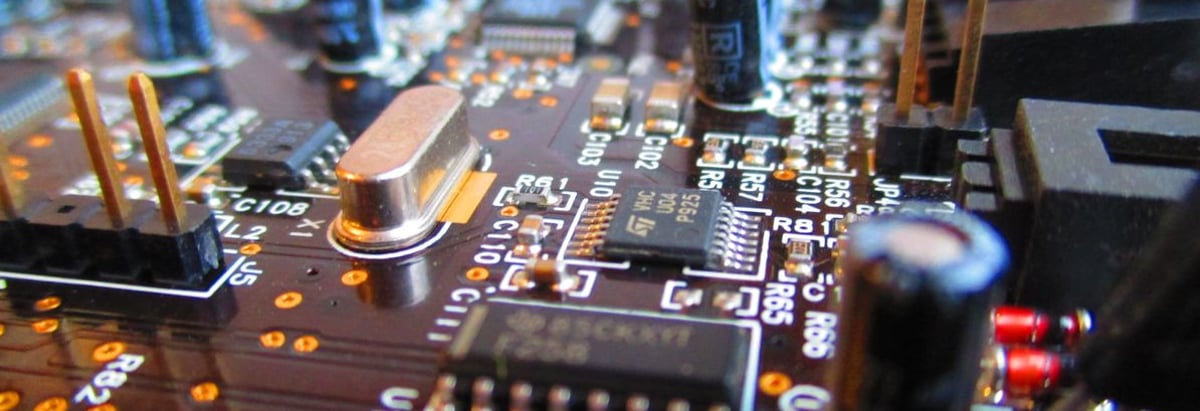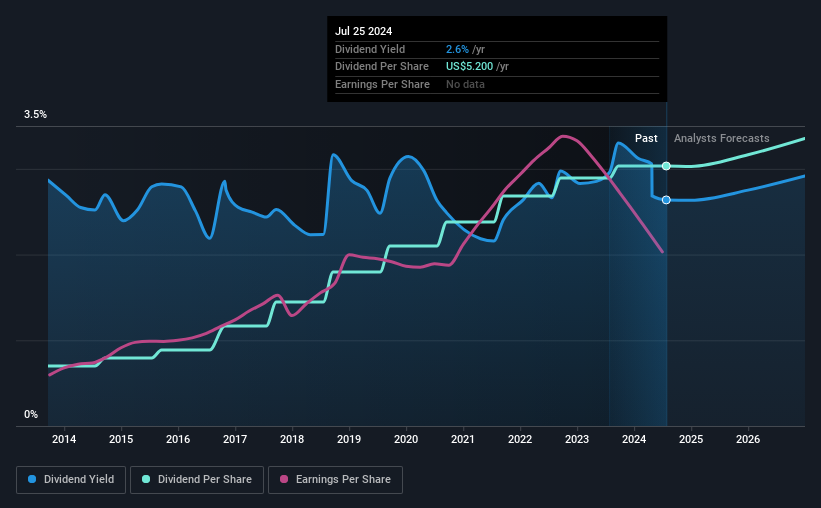Stock Analysis
- United States
- /
- Semiconductors
- /
- NasdaqGS:TXN
Dividend Investors: Don't Be Too Quick To Buy Texas Instruments Incorporated (NASDAQ:TXN) For Its Upcoming Dividend

Regular readers will know that we love our dividends at Simply Wall St, which is why it's exciting to see Texas Instruments Incorporated (NASDAQ:TXN) is about to trade ex-dividend in the next 4 days. The ex-dividend date is one business day before the record date, which is the cut-off date for shareholders to be present on the company's books to be eligible for a dividend payment. The ex-dividend date is an important date to be aware of as any purchase of the stock made on or after this date might mean a late settlement that doesn't show on the record date. In other words, investors can purchase Texas Instruments' shares before the 31st of July in order to be eligible for the dividend, which will be paid on the 13th of August.
The company's upcoming dividend is US$1.30 a share, following on from the last 12 months, when the company distributed a total of US$5.20 per share to shareholders. Looking at the last 12 months of distributions, Texas Instruments has a trailing yield of approximately 2.6% on its current stock price of US$197.15. If you buy this business for its dividend, you should have an idea of whether Texas Instruments's dividend is reliable and sustainable. So we need to investigate whether Texas Instruments can afford its dividend, and if the dividend could grow.
View our latest analysis for Texas Instruments
Dividends are typically paid from company earnings. If a company pays more in dividends than it earned in profit, then the dividend could be unsustainable. It paid out 89% of its earnings as dividends last year, which is not unreasonable, but limits reinvestment in the business and leaves the dividend vulnerable to a business downturn. We'd be concerned if earnings began to decline. Yet cash flow is typically more important than profit for assessing dividend sustainability, so we should always check if the company generated enough cash to afford its dividend. It paid out an unsustainably high 313% of its free cash flow as dividends over the past 12 months, which is worrying. Our definition of free cash flow excludes cash generated from asset sales, so since Texas Instruments is paying out such a high percentage of its cash flow, it might be worth seeing if it sold assets or had similar events that might have led to such a high dividend payment.
Texas Instruments paid out less in dividends than it reported in profits, but unfortunately it didn't generate enough cash to cover the dividend. Cash is king, as they say, and were Texas Instruments to repeatedly pay dividends that aren't well covered by cashflow, we would consider this a warning sign.
Click here to see the company's payout ratio, plus analyst estimates of its future dividends.

Have Earnings And Dividends Been Growing?
Companies that aren't growing their earnings can still be valuable, but it is even more important to assess the sustainability of the dividend if it looks like the company will struggle to grow. If business enters a downturn and the dividend is cut, the company could see its value fall precipitously. That explains why we're not overly excited about Texas Instruments's flat earnings over the past five years. We'd take that over an earnings decline any day, but in the long run, the best dividend stocks all grow their earnings per share. Earnings have been growing somewhat, but we're concerned dividend payments consumed most of the company's cash flow over the past year.
Many investors will assess a company's dividend performance by evaluating how much the dividend payments have changed over time. Texas Instruments has delivered an average of 16% per year annual increase in its dividend, based on the past 10 years of dividend payments.
Final Takeaway
Should investors buy Texas Instruments for the upcoming dividend? In addition to earnings being flat, Texas Instruments is paying out a reasonable percentage of its earnings as profits. However, the dividend was not well covered by free cash flow. Overall it doesn't look like the most suitable dividend stock for a long-term buy and hold investor.
With that being said, if you're still considering Texas Instruments as an investment, you'll find it beneficial to know what risks this stock is facing. Case in point: We've spotted 1 warning sign for Texas Instruments you should be aware of.
A common investing mistake is buying the first interesting stock you see. Here you can find a full list of high-yield dividend stocks.
Valuation is complex, but we're here to simplify it.
Discover if Texas Instruments might be undervalued or overvalued with our detailed analysis, featuring fair value estimates, potential risks, dividends, insider trades, and its financial condition.
Access Free AnalysisHave feedback on this article? Concerned about the content? Get in touch with us directly. Alternatively, email editorial-team (at) simplywallst.com.
This article by Simply Wall St is general in nature. We provide commentary based on historical data and analyst forecasts only using an unbiased methodology and our articles are not intended to be financial advice. It does not constitute a recommendation to buy or sell any stock, and does not take account of your objectives, or your financial situation. We aim to bring you long-term focused analysis driven by fundamental data. Note that our analysis may not factor in the latest price-sensitive company announcements or qualitative material. Simply Wall St has no position in any stocks mentioned.
Have feedback on this article? Concerned about the content? Get in touch with us directly. Alternatively, email editorial-team@simplywallst.com
About NasdaqGS:TXN
Texas Instruments
Designs, manufactures, and sells semiconductors to electronics designers and manufacturers in the United States and internationally.
Excellent balance sheet average dividend payer.

